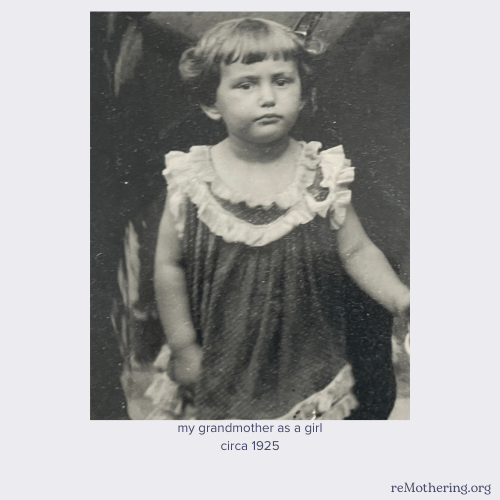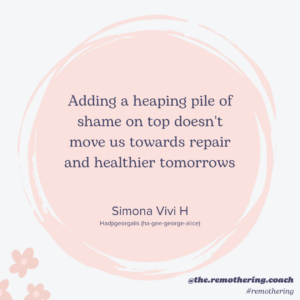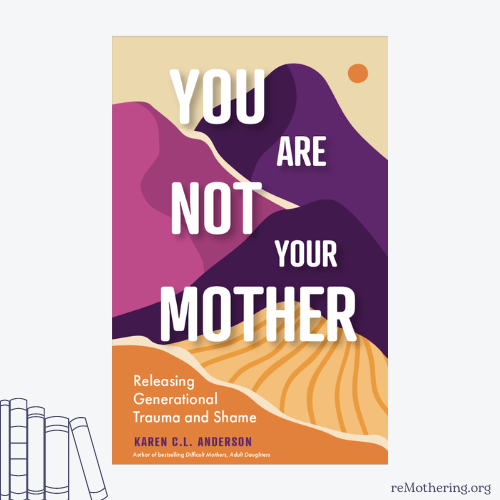Releasing Generational Shame
Best selling author Karen C.L. Anderson offers steps we can take to unshame ourselves, as she lovingly guides us on how to become a cycle-breaker.
In this article:
- Editorial Review
- A visit with my 107 year-old aunt (a glimpse into intergenerational shame)
- You Are Not Your Mother: releasing generational trauma and shame
(new book by Karen C.L. Anderson)
Editorial Review
“Through the power of story, You Are Not Your Mother: Releasing Generational Trauma & Shame speaks directly to the parts of our minds that most need to hear these messages. While our rational selves are busy learning the steps we can follow to unshame ourselves, our more tender parts get to experience what it feels like to be loved as we are.”
—Simona Vivi H, founder of The Center for Remothering and of reMothering.org
—
My Own Story of Intergenerational Shame
Last Friday, I had linner (late lunch/early dinner) with my grandmother’s older sister, my great aunt Lil. She’s 107, which makes for some interesting conversations.
I am still unpacking some of our conversations, which is typical for me after our visits. On the one hand, there are the rich life lessons and wisdom that come from a wide-angle lens perspective on a human life span.
And, on the other hand, even with all that earned wisdom, she has stuck parts (as we all do). The filters she never realized were history-colored glasses, lenses to be cleaned. For example, on a past visit, she mentioned that my grandmother was difficult and mouthy as a child. When I asked what she meant by that statement, my aunt explained that my grandmother wouldn’t go along with the program. In other words, she had an opinion. The consequence of having an opinion: my grandmother would be hit with a belt.
Ummm?
Can we pause a moment and realize that a child should not have needed to choose between expressing herself and being physically abused. That’s not proof that she was mouthy. It points to a strong chance that my great-grandfather got back from WWI with PTSD, and expressed it in a tragically unhealthy way.

The tale of intergenerational trauma and shame.
My grandmother came out of her childhood environment with adaptations and coping strategies. One of those was being critical. My mother’s human response to that harsh treatment was developing her own reflexive coping strategies. And so it passes down the generations…. until we do our work to shift from reflexive responses to intentional.
—
Choosing the red pill (Matrix reference) offers freedom and healing. But it comes with a cost. When we see certain things more clearly, it can feel super unpleasant. Especially when we see how our early programming and reflexive behavior impacted someone else. But, when we learn how to sit with remorse without getting trapped in a shame pit, we can work towards healthy repair.

To quote Maya Angelou, if we knew better, we would have done better.
But we don’t know better until we do. If/when we realize we’ve inadvertently made mistakes, or we notice that we’ve shown up differently than we wish we would have, we have a responsibility to the people we love most in our lives (including our inner young-ones) to move towards repair and healthier tomorrows.
How do we release shame?
In her upcoming book on unshaming ourselves, best selling author Karen C.L. Anderson offers steps we can take to unshame ourselves, as she lovingly guides us on how to become a cycle-breaker. You can pre-order your copy on Amazon here.
We can also continue on our remothering journeys. We can be there for ourselves, hold space as we face the uncomfortable, and cultivate an inside-out sense internal safety that supports us in take loving forward action.
Remother on!
From my heart to yours,
Simona
You are not your Mother, Releasing Generational Trauma and Shame
by Karen C.L. Anderson

#1 New Release in Adult Children of Alcoholics
Available for pre-order here
“Karen is the wise voice you want whispering in your ear when shame knocks on your door, reminding you that you are so much more than your relationship with your mother.”
—Maggie Reyes, bestselling author of The Questions for Couples Journal